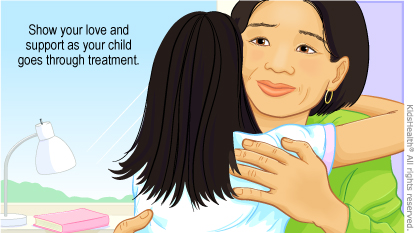Binge Eating Disorder: How to Care for Your Child
Kids with binge eating disorder regularly eat large amounts of food even when they are not hungry (binge eat). They feel out of control and upset by the behavior. People with binge eating disorder are cared for by a team of medical specialists to help them reach a healthy weight, develop healthy habits, and change the way they think of food and their body.


Follow the care team's recommendations for:
-
your child's meal plan (A meal plan will tell you what your child should eat in a day to stay healthy. Help your child to follow this meal plan.)
-
whether your child needs any medicines
-
whether your child should weigh themselves
-
helping your child set limits for social media use
-
going to follow-up care visits
Encourage your child to make healthy choices, such as:
-
not skipping meals (People are more likely to overeat if they get too hungry.)
-
getting enough sleep
-
practicing mindful eating (paying attention to what they eat and noticing when they feel full)
-
identifying triggers (Some people binge eat when they're stressed or upset. Make a plan with your child for how they can avoid or manage things that trigger binge eating.)
-
being active (Regular exercise can feel good and help children manage their weight.)
Help your child have a healthy body image.
-
Be a role model. Don't criticize your own or other people's weight, body, or looks. Talk about bodies in positive ways.
-
Avoid talking about weight.

Your child
-
won't follow the meal plan or continues to overeat
-
gains or loses a lot of weight
-
uses laxatives, throwing up, overexercising, or other means to get rid of weight
-
expresses thoughts of self-injury

You are worried that your child may try to commit suicide (end their life) or they have talked about a specific plan for suicide. You or your child also can call or text the National Suicide Prevention Lifeline at 988.

What causes binge eating disorder? The exact cause of binge eating disorder isn't clear. It probably happens from a combination of a genetic (inherited) tendency, family eating habits, emotions, and eating behavior like skipping meals. Some kids use food to soothe themselves or cope with difficult feelings.
What are the symptoms of binge eating disorder? Binge eating disorder is when a person regularly eats a lot of food (more than what's needed) in a short time. They feel like they can't stop eating, even after they're full. Many people who binge eat are overweight. But those at a healthy weight can also have a binge eating disorder. People with binge eating disorder usually are unhappy about their weight and often feel depressed.
Someone who's binge eating might:
-
eat a lot of food quickly
-
hide food containers or wrappers in their room
-
have big changes in their weight (up or down)
-
skip meals, eat at unusual times (like late at night), and eat alone
-
have a history of eating in response to emotional stress (like family conflict, peer rejection, or school problems)
How is binge eating disorder treated? Binge eating is treated by a care team of specialists that includes doctors, behavioral health providers, and a dietitian. These experts work together to monitor the child's medical health, provide counseling, and make dietary recommendations.
The doctor might prescribe medicine to treat binge eating, anxiety, depression, or other mental health concerns.
Some kids can be treated at home with close follow-up with the care team. Others may go to a special program during the day to get help. Some kids need to stay in the hospital to make sure they get the treatment they need.